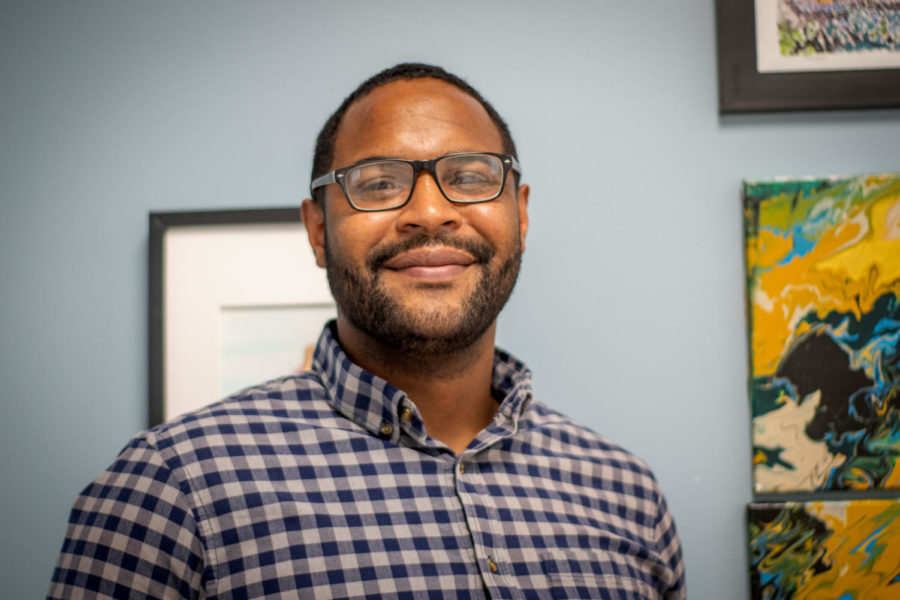Trust, empowerment: Foster vows progress in Title IX office
September 7, 2022

As a student at Tulane University’s Law School, Marcus Foster thought he wanted to be a sports agent. In a time of many high-profile sexual misconduct cases surrounding professional and collegiate athletes, a common and unfounded narrative focused on Black men as the core of the issue.
Foster believed that narrative was lazy and dishonest.
He dedicated the rest of his legal education to studying the nuances of the law — for student athletes and college campuses as a whole. Now, he is the new chief Title IX officer at Tulane, determined to earn trust and forge progress on a campus demanding accountability for sexual misconduct.
“Our door is always open,” Foster said of the Title IX Office. “We will never say no to an opportunity to connect.”
Working as a student attorney at a domestic violence clinic, Foster said he was able to “deep dive into this work and do something that I became truly passionate about, committed to raising awareness and bringing education to the prevalence of these issues.”
Most recently, Foster served as the Title IX Coordinator in the Office of Diversity and Equity at State University of New York at Geneseo, where he oversaw the college’s efforts to create new policies for incidents of sexual harassment.
For Foster, coming back to Tulane feels full circle. He always planned to return to New Orleans after graduating from law school and is excited to be a part of an institution that “encourages excellence across the board.”
“I couldn’t be happier to be back in a city I care deeply about and an institution that I love, that I’m familiar with, that really ingrained these issues into me and have made me into the professional that I am today,” Foster said.
In his first year at Tulane, Foster said he plans to be as visible and as present as possible, engaging in both formal and informal opportunities to collaborate with students and employees. He also said he will take time to learn as much information about the campus community, the culture and the mentality that surrounds sexual misconduct at Tulane.
Foster joins Tulane at a unique time: last year, controversy surrounded an anonymous Instagram account that shared student stories of sexual misconduct. After the shutdown of the account, an anonymous, unverified list of alleged sexual assailants called “Vigilante Justice” circulated around the student body. On Nov. 17, more than 500 students gathered outside of McAlister Auditorium to protest the prevalence of sexual misconduct at Tulane and hear survivors of sexual violence share their experiences.
Foster emphasized the importance of community members using the power they have in their own spheres of influence to speak out against these behaviors.
“It is my job to give students the tools and the skills to be able to feel empowered. To hold their peers accountable and to explicitly state what the values and missions are,” Foster said. “Their voice is going to be heard. Their voice will never be quieted. And they have an opportunity to not only voice concerns, but meet me halfway.”
Tulane is currently awaiting data from last year’s climate assessment. Those results will likely not be available until next spring.
Foster highlighted the significance of being proactive in the interim by cultivating relationships with people across campus “so they feel empowered and they feel willing to come and address the results of the campus climate and be thinking about these solutions creatively.”
Foster also acknowledged the relation between alcohol and Title IX issues on campus. According to the 2017 Climate Survey, 74% of women and 87% of men who experienced any form of sexual assault reported they were incapacitated by alcohol at the time.
“It is absolutely necessary that individuals put the responsibility on the offender when we’re talking about these issues,” Foster said. But “there has to be an acknowledgement of ways in which we are looking out for one another and creating a campus community that is not only civil, but is engaging in healthy behaviors and responsible decision making.”
Foster spoke about programming and training opportunities that would push individuals to think critically about how to intervene in behaviors that may lead to misconduct.
“Before an incident of misconduct ever happens, there are individuals who can intervene, who can do something to make sure that their peers, their friends, their colleagues are safe,” Foster said. “And we really want to focus on those bystanders and focus on those individuals that have the capacity to do something, because the worst thing you can do is to do nothing.”
Foster said his goal is to make himself and the Title IX Office accessible to the community.
“We want to be student centered,” he said. “We want to be student facing, letting students, faculty and staff know that they can come to us not just if they have experienced these traumatic behaviors, but if they’re looking to be proactive and bring education to the classrooms, to organizational workshops.”
Outside of work, Foster enjoys going on hikes with his 5-year-old weimaraner, cooking and spending time with his family back home in Pennsylvania. But at Tulane, he said, this work must be done together.
“We know that the only way we’re going to see a reduction and ultimately an elimination of these behaviors, is if we have campus buy-in and we have stakeholders from the entire university feeling empowered and encouraged to speak up,” Foster said.






















Leave a Comment